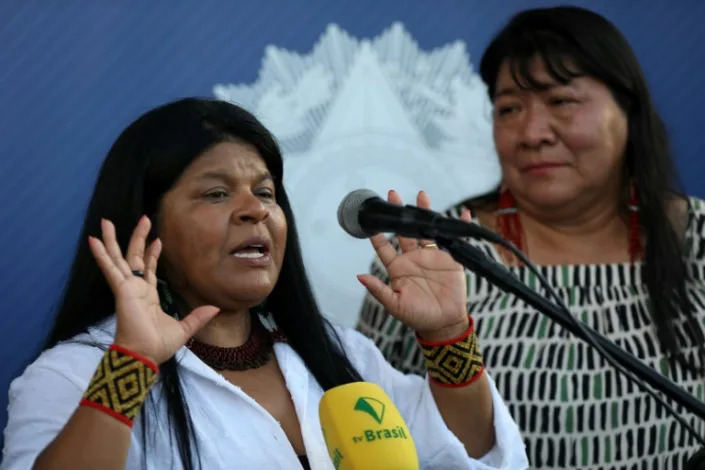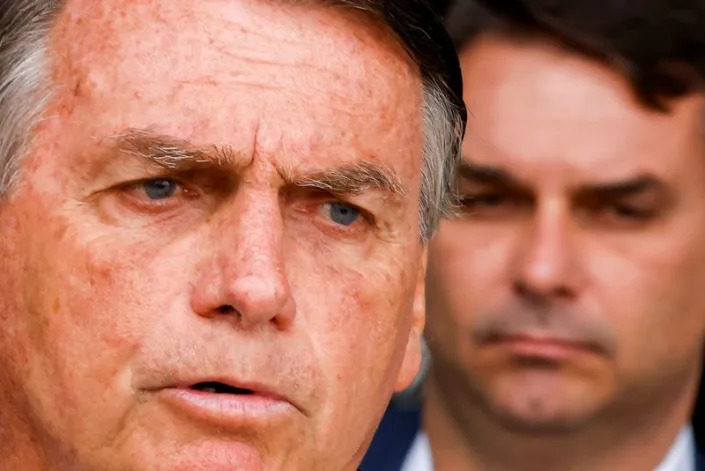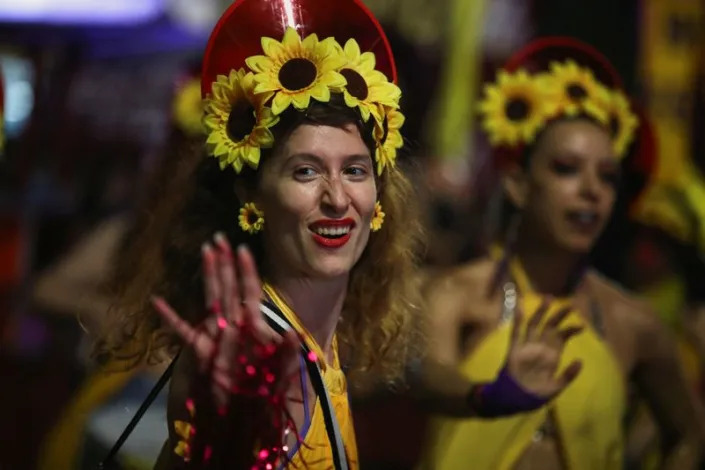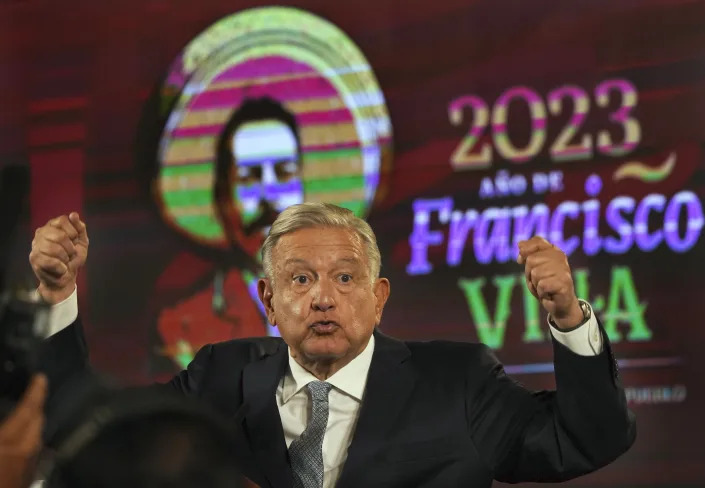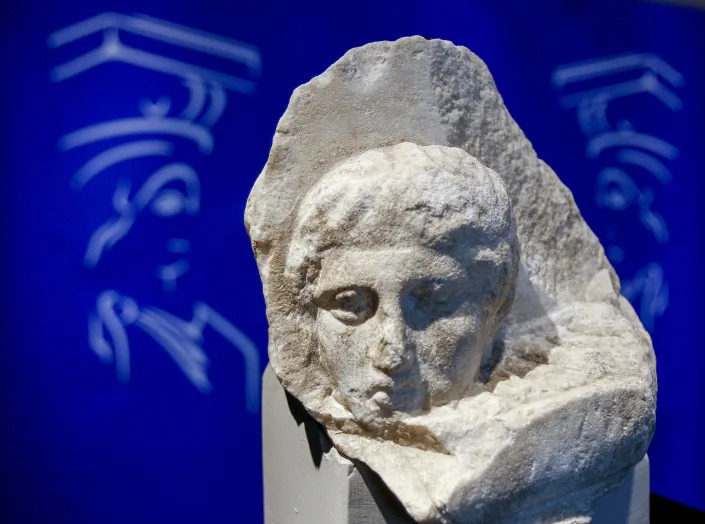
The marble head of a young man, a tiny fragment from the 2,500-year-old sculptured decoration of the Parthenon Temple on the ancient Acropolis, is displayed during a presentation to the press at the new Acropolis Museum in Athens, Nov. 5, 2008. The Vatican and Greece were finalizing a deal Tuesday March 7, 2023 to return three fragments of the Parthenon Marbles that have been in the collection of the Vatican Museums for two centuries.
(AP Photo/Thanassis Stavrakis, File)
NICOLE WINFIELD and DEREK GATOPOULOS
Tue, March 7, 2023
ROME (AP) — The Vatican and Greece finalized a deal Tuesday for the return of three sculpture fragments from the Parthenon that have been in the collection of the Vatican Museums for two centuries, the latest case of a Western museum bowing to demands for restitution.
The Vatican has termed the return an ecumenical “donation” to the Orthodox Christian archbishop of Athens and all Greece, not necessarily a state-to-state transfer. But it nevertheless puts pressure on the British Museum to conclude a deal with Greece over the fate of its much bigger collection of Parthenon sculptures.
The head of the Vatican city-state, Cardinal Fernando Vergez, signed an agreement to implement the “donation” during a private Vatican Museums ceremony with Greek Culture Minister Lina Mendoni and a representative of the Orthodox Christian archbishop of Athens and all Greece, His Beatitude Ieronymos II.
The envoy, Father Emmanuel Papamikroulis, told The Associated Press that the Greek Orthodox Church and archbishop were grateful to Pope Francis for the deal.
"It has taken place at a difficult time for our country, and it will hopefully provide some sense of pride and happiness. I hope this initiative is followed by others,” he said in a telephone interview from the Vatican, where he was touring the gardens after the signing ceremony.
“This initiative does help heal wounds of the past and it demonstrates that when Christian leaders work together, they can resolve issues in a practical way," Papamikroulis added.
The fragments are expected to arrive in Athens later this month, with a March 24 ceremony planned to receive them.
The British Museum has refused decades of appeals from Greece to return its much larger collection of Parthenon sculptures, which have been a centerpiece of the museum since 1816.
Earlier this month, however, the chair of the British Museum said the U.K. and Greece were working on a deal that would see his institution’s Parthenon Marbles displayed in both London and Athens.
The 5th century B.C. sculptures are mostly remnants of a 160-meter-long (520-foot) frieze that ran around the outer walls of the Parthenon Temple on the Acropolis, dedicated to Athena, goddess of wisdom.
Much of the frieze and the temple’s other sculptural decoration were lost in a 17th-century bombardment, and about half the remaining works were removed in the early 19th century by a British diplomat, Lord Elgin.
___
Gatopoulos contributed from Athens.
NICOLE WINFIELD and DEREK GATOPOULOS
Tue, March 7, 2023
ROME (AP) — The Vatican and Greece finalized a deal Tuesday for the return of three sculpture fragments from the Parthenon that have been in the collection of the Vatican Museums for two centuries, the latest case of a Western museum bowing to demands for restitution.
The Vatican has termed the return an ecumenical “donation” to the Orthodox Christian archbishop of Athens and all Greece, not necessarily a state-to-state transfer. But it nevertheless puts pressure on the British Museum to conclude a deal with Greece over the fate of its much bigger collection of Parthenon sculptures.
The head of the Vatican city-state, Cardinal Fernando Vergez, signed an agreement to implement the “donation” during a private Vatican Museums ceremony with Greek Culture Minister Lina Mendoni and a representative of the Orthodox Christian archbishop of Athens and all Greece, His Beatitude Ieronymos II.
The envoy, Father Emmanuel Papamikroulis, told The Associated Press that the Greek Orthodox Church and archbishop were grateful to Pope Francis for the deal.
"It has taken place at a difficult time for our country, and it will hopefully provide some sense of pride and happiness. I hope this initiative is followed by others,” he said in a telephone interview from the Vatican, where he was touring the gardens after the signing ceremony.
“This initiative does help heal wounds of the past and it demonstrates that when Christian leaders work together, they can resolve issues in a practical way," Papamikroulis added.
The fragments are expected to arrive in Athens later this month, with a March 24 ceremony planned to receive them.
The British Museum has refused decades of appeals from Greece to return its much larger collection of Parthenon sculptures, which have been a centerpiece of the museum since 1816.
Earlier this month, however, the chair of the British Museum said the U.K. and Greece were working on a deal that would see his institution’s Parthenon Marbles displayed in both London and Athens.
The 5th century B.C. sculptures are mostly remnants of a 160-meter-long (520-foot) frieze that ran around the outer walls of the Parthenon Temple on the Acropolis, dedicated to Athena, goddess of wisdom.
Much of the frieze and the temple’s other sculptural decoration were lost in a 17th-century bombardment, and about half the remaining works were removed in the early 19th century by a British diplomat, Lord Elgin.
___
Gatopoulos contributed from Athens.
\
Greece asks others to 'imitate' Vatican return of Parthenon pieces

Snowfall in Athens
Tue, March 7, 2023
By Philip Pullella
VATICAN CITY (Reuters) - The Vatican Museums gave Greece three 2,500-year-old pieces of the Parthenon on Tuesday and the Greek side said the gesture should be imitated by others, a likely reference to a collection of sculptures from the ancient temple that are held by Britain.
The fragments have been in the papal collections of the Vatican Museums for more than a century and Pope Francis ordered their return last December.
The pope has donated them to Ieronymos II, the head of the Greek Orthodox Church, as a gesture of ecumenical dialogue with the Roman Catholic Church.
Ieronymos' representative at Tuesday's signing ceremony at the Vatican Museums, Rev. Papamikroulis Emmanouil, called the pope's gesture "historic".
Emmanouil said there was "much left to do to heal the wounds and traumas suffered by this monument (the Parthenon) because of practices that belong to a distant past".
"The hope is ... that his gesture by the Holy Father will be imitated by others. His Holiness the pope of Rome has proven that this is possible and realistic," he said.
The Parthenon, which is on the Acropolis in Athens, was completed in the fifth century BC as a temple to the goddess Athena, and its decorative friezes contain some of the greatest examples of ancient Greek sculpture.
According to the Vatican Museums website, one piece being returned to Greece is the head of the horse that was pulling Athena's chariot on the west side of the building. The others are from the head of a boy and the head of a bearded male.
In his address at the signing ceremony the governor of Vatican City, Cardinal Fernando Vergez, said the three pieces were acquired by the papacy "correctly" at the start of the 19th century. He did not elaborate.
With the donation to Greece, the Vatican Museums no longer holds any parts of the Parthenon.
The pieces are being returned as London and Athens have entered talks over the a collection known as the Parthenon Sculptures held by the British Museum.
Greece has repeatedly called for the permanent return of the sculptures, which British diplomat Lord Elgin removed from the temple in the early 19th century when he was ambassador to the Ottoman Empire, Greece's then-ruler.
The British Museum has long ruled out returning the marbles, which include about half of the 160-metre (525-foot) frieze that adorned the Parthenon, and insists they were legally acquired.
Last month, British Museum chair George Osborne said the UK was working on a new arrangement with Greece through which the Parthenon Sculptures could be seen both in London and in Athens.
(This story has been refiled to specify that the Pope ordered the return of fragments last December, in paragraph 2)
(Reporting by Philip Pullella; Editing by Frank Jack Daniel)

Snowfall in Athens
Tue, March 7, 2023
By Philip Pullella
VATICAN CITY (Reuters) - The Vatican Museums gave Greece three 2,500-year-old pieces of the Parthenon on Tuesday and the Greek side said the gesture should be imitated by others, a likely reference to a collection of sculptures from the ancient temple that are held by Britain.
The fragments have been in the papal collections of the Vatican Museums for more than a century and Pope Francis ordered their return last December.
The pope has donated them to Ieronymos II, the head of the Greek Orthodox Church, as a gesture of ecumenical dialogue with the Roman Catholic Church.
Ieronymos' representative at Tuesday's signing ceremony at the Vatican Museums, Rev. Papamikroulis Emmanouil, called the pope's gesture "historic".
Emmanouil said there was "much left to do to heal the wounds and traumas suffered by this monument (the Parthenon) because of practices that belong to a distant past".
"The hope is ... that his gesture by the Holy Father will be imitated by others. His Holiness the pope of Rome has proven that this is possible and realistic," he said.
The Parthenon, which is on the Acropolis in Athens, was completed in the fifth century BC as a temple to the goddess Athena, and its decorative friezes contain some of the greatest examples of ancient Greek sculpture.
According to the Vatican Museums website, one piece being returned to Greece is the head of the horse that was pulling Athena's chariot on the west side of the building. The others are from the head of a boy and the head of a bearded male.
In his address at the signing ceremony the governor of Vatican City, Cardinal Fernando Vergez, said the three pieces were acquired by the papacy "correctly" at the start of the 19th century. He did not elaborate.
With the donation to Greece, the Vatican Museums no longer holds any parts of the Parthenon.
The pieces are being returned as London and Athens have entered talks over the a collection known as the Parthenon Sculptures held by the British Museum.
Greece has repeatedly called for the permanent return of the sculptures, which British diplomat Lord Elgin removed from the temple in the early 19th century when he was ambassador to the Ottoman Empire, Greece's then-ruler.
The British Museum has long ruled out returning the marbles, which include about half of the 160-metre (525-foot) frieze that adorned the Parthenon, and insists they were legally acquired.
Last month, British Museum chair George Osborne said the UK was working on a new arrangement with Greece through which the Parthenon Sculptures could be seen both in London and in Athens.
(This story has been refiled to specify that the Pope ordered the return of fragments last December, in paragraph 2)
(Reporting by Philip Pullella; Editing by Frank Jack Daniel)
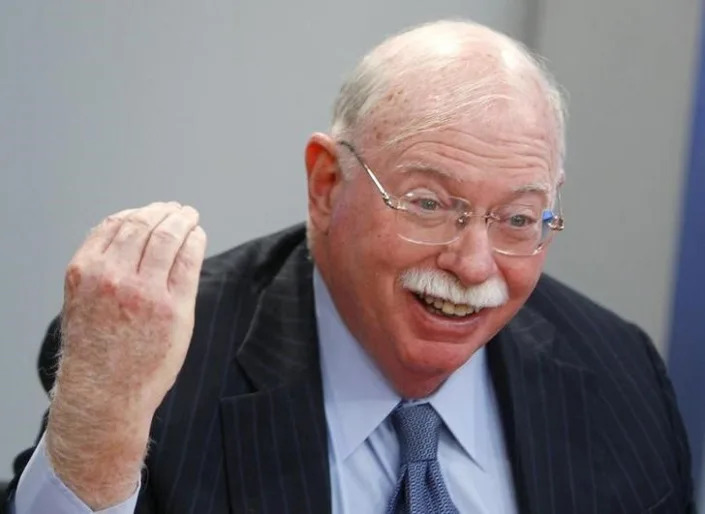
.jpg)







